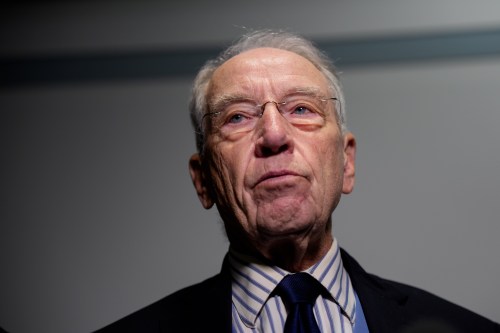Turn any article into a podcast. Upgrade now to start listening.
Premium Members can share articles with friends & family to bypass the paywall.
You’re reading The Morning Dispatch, our flagship daily newsletter explaining all the news you need to know today in fewer than 10 minutes. To unlock the full version, become a Dispatch member today.
Happy Monday! The Albanian prime minister announced that the country’s AI-generated minister, Diella, is “pregnant” with 83 children. Yes, that is a real news story. 2025 is just that weird.
Quick Hits: Today’s Top Stories
- U.S. and Chinese officials announced on Sunday that both countries had agreed on a framework for a deal to address export restrictions, tariffs, and the illicit fentanyl trade, with Treasury Secretary Scott Bessent telling NBC’s Meet the Press Sunday that China is “ready to make a deal.” He added, “I believe we’ve reached a very substantial framework” to avert President Donald Trump’s threatened additional 100 percent tariffs on China, which were scheduled to take effect on November 1. The deal was discussed during the Association of Southeast Asian Nations (ASEAN) summit in Malaysia over the weekend, where Trump announced trade and critical mineral deals with four Southeast Asian countries—Cambodia, Malaysia, Thailand, and Vietnam—and also oversaw the signing of an expanded ceasefire deal between Cambodia and Thailand. Trump had previously threatened to impose trade penalties on the warring countries if they were unable to widen a current truce.
- After Trump said Thursday night that an unnamed “patriot” donated $130 million to compensate military service members during the ongoing government shutdown, the New York Times on Saturday identified the anonymous donor as billionaire Timothy Mellon, the grandson of businessman and former Treasury Secretary Andrew Mellon. The White House has not yet announced plans for the funds disbursement, and the Times reported that the $130 million sum could pay each service member $100 if divided equally. Bessent told CBS News on Sunday that, while he “thinks” the government can pay service members in early November, they are currently set to miss paychecks starting on November 15. Meanwhile, the Department of Agriculture announced on Saturday that food stamp programs will be paused on November 1. In a statement on its website blaming Senate Democrats for the shutdown, the agency wrote, “Bottom line, the well has run dry.”
- Secretary of Defense Pete Hegseth on Friday ordered the U.S.S. Gerald R. Ford—an aircraft carrier currently stationed in the Mediterranean Sea—to relocate to the U.S. Southern Command region, which includes the area around Latin America. In an X post announcing the move, Pentagon spokesman Sean Parnell said that the vessel will support current counternarcotic operations in the region, and work “to detect, monitor, and disrupt illicit actors and activities that compromise the safety and prosperity” of the United States. Earlier that morning, Hegseth announced on X that U.S. forces conducted a strike on a suspected narcotics-carrying drugboat in the Caribbean Sea, which he said was operated by the Venezuelan-based cartel, Tren de Aragua, and killed all six aboard. “If you are a narco-terrorist smuggling drugs in our hemisphere,” he tweeted, “we will treat you like we treat Al-Qaeda.” On Sunday, a U.S. warship docked in the capital of Trinidad and Tobago, which neighbors Venezuela.
- Argentine citizens voted on Sunday in the country’s midterm elections, with results showing that President Javier Milei’s libertarian party, La Libertad Avanza (LLA), dramatically overperformed expectations. In the capital city region of Buenos Aires, LLA won 41.5 to 40.8 percent against the Peronist opposition coalition, despite the area being a longtime base of support for pro-Peronist candidates. Nationwide, with 99 percent of official votes tallied, Milei’s party received about 41 percent of the vote, more than any other coalition or party.
- Russia attacked Ukrainian cities overnight on Friday with missiles and drones, killing four civilians and injuring at least 31 others, including seven children. The Ukrainian capital city, Kyiv, took the brunt of the aerial attack, with city Mayor Vitali Klitschko posting during the attack, “Explosions in the capital. The city is under ballistic attack.” Meanwhile, Russian leader Vladimir Putin announced Sunday that the country had conducted a successful test launch of its nuclear-powered and nuclear-capable Burevestnik missile, a new tech weapon that he said “no one in the world has.” According to Russia’s military, the Burevestnik missile has a maximum range of 8,700 miles, more than twice Earth’s radius. This morning, Russian military officials claimed to have intercepted 193 Ukrainian drones during an overnight assault on Moscow, with regional officials reporting one fatality from the strikes.
Don’t Cry for Him

Economic Nobel Laureate Simon Kuznets may have once said that there are only four types of economies: developed, developing, Japan, and Argentina. The quote is apocryphal, but it’s still accurate.
At the turn of the 20th century, Argentina was one of the wealthiest nations in the world. A century ago, Argentines were about as rich as Germans, Canadians, and the French. But decades of economic and political mismanagement shifted the country into reverse, making it the only modern state to decline in such a dramatic fashion. Today, Argentina’s per capita GDP is comparable to countries like Serbia, Georgia, and the Dominican Republic.
For the past two years, however, Argentine President Javier Milei has been on an ambitious mission to reverse his country’s fortunes yet again and put Argentina on a path toward economic stability. But in the lead-up to yesterday’s midterm legislative elections—Milei’s first major political test since taking office in December 2023—the president’s previously strong standing with the Argentine public began to erode under pressure from high-profile scandals, policy mistakes, and reform fatigue. The consensus was that Milei’s party, La Libertad Avanza (LLA), was about to be slapped at the ballot box. The only question was how hard.
You are receiving the free, truncated version of The Morning Dispatch. To read the full newsletter—and unlock all of our stories, podcasts, and community benefits—join The Dispatch as a paying member.
Earlier this fall, bribery allegations against Karina Milei, President Milei’s sister and closest adviser, damaged Milei’s image as a political outsider tasked with challenging the country’s corrupt establishment. LLA also lost heavily to Peronist opposition in Buenos Aires’ provincial elections last month—a signal that the government’s reform agenda might be losing support among the Argentine people. This defeat triggered widespread uncertainty in global markets about the prospects of Milei’s government and led to a sell-off of the peso. On the verge of yet another monetary crisis, Milei turned to the White House for help, and last week, the U.S. Treasury threw Milei’s drowning government a life preserver. The two countries’ $20 billion currency swap line briefly stabilized the Argentine economy as voters headed to the polls over the weekend. And shortly before the election, José Luis Espert—Milei’s top candidate for the nation's key battleground region, Buenos Aires Province—resigned over his financial ties to an alleged drug-trafficker.
But as ballots were counted across Argentina on Sunday evening, an unexpected result emerged. Milei’s party, contrary to recent expectations, won big—a signal that much of the country is still on board with the free market crusader’s ambitious reform agenda. As of this morning, LLA had received 41 percent of the votes nationwide with more than 99 percent of ballots counted, beating the closest opposition party by nearly a 10-point margin. More crucially, LLA gained 64 seats in the lower house. This crosses the critical one-third threshold, letting LLA block opposition bills and back presidential decrees. Milei’s legislative gains create an opportunity to pursue the deeper structural reforms economists say Argentina needs—if he can build the political coalitions his go-it-alone approach has so far avoided.
Milei—a libertarian economist—ran for Argentina’s presidency amid prolonged economic stagnation and runaway inflation. By 2023, the country’s economy had not seen meaningful growth for more than a decade, and annualized inflation was climbing quickly into the triple digits. Under President Alberto Fernández’s Peronist coalition, which won the presidency in 2019, Argentina was racing toward uncontrollable hyperinflation, debt default, and economic collapse.
“There was a sense that there was a need for radical change,” Emilio Ocampo, an Argentine economist and historian at the University of CEMA in Buenos Aires, told TMD. “And the only person who embodied that possibility was Javier Milei.”
Within his first months in office, Milei cut the number of government ministries in half, fired thousands of state employees, and implemented hundreds of deregulations. He entered office in December 2023 promising to cut down Argentina’s chronically high government spending and expansive regulatory regime. By the end of 2024, Milei had cut government spending by around 30 percent. Argentina recorded its first budget surplus in more than a decade.
Milei’s reforms weren’t only successful for the country’s balance sheet. Poverty in Argentina decreased from more than 50 percent at the beginning of 2024 to below 40 percent by the end of Milei’s first year in office. GDP growth also rebounded, with the OECD estimating that Argentina’s economy will grow by 5.2 percent in 2025 and 4.6 percent in 2026, up from contractions of 1.9 percent and 1.3 percent in 2023 and 2024. The government’s elimination of rent controls also sparked a revival in the country’s housing market. Real rents have fallen by almost a third, and rental supply has tripled.
Many economists credit Milei with achieving what much of the field thought was all but impossible for Argentina—quick, substantive reform. “He addressed the fiscal and institutional side of the equation,” Monica de Bolle, an economist at the Peterson Institute for International Economics, told TMD. “What he did was commendable—very deep and very ambitious reforms. And he was actually able to do them, which is surprising.”
But there is also a growing consensus that Milei’s successes are still partial. “All these deregulations that we hear about, they are great, but they are not the big reforms, the big regulations,” Nicolas Cachanosky, an Argentine economist at the University of Texas at El Paso, told TMD. According to Cachanosky, several much larger systemic reforms are still needed for the fiscal and deregulatory achievements of the Milei government to truly change the country’s long-term trajectory—most notably, reforms to welfare programs, labor market regulation, and taxes. “Those are much deeper structural changes than the ones we’ve seen so far,” Cachanosky said.
While Milei has successfully stabilized Argentina’s economy—at least for the time being—he has done so without much support from the country’s bicameral National Congress. As a result, Milei has leaned heavily on reforms that he can implement through executive decrees, which, like executive orders issued by American presidents, lack the durability of formal legislation. “Once you stabilize the economy, you need to pass new bills—tax reform, pension reform, labor reform—things that would improve your competitiveness over time,” Sergio Berensztein, a Buenos Aires-based political analyst, told TMD.
Argentina’s other looming challenge is its idiosyncratic currency regime. Most Argentines actually save, price, and spend in U.S. dollars, rather than the country’s legal currency, the peso, which they don’t trust. This makes Argentina particularly vulnerable to dollar shortages during periods of economic uncertainty and dramatically limits the government’s monetary capabilities. Many economists believe that the only feasible way out of this is through official dollarization—a strategy that Milei initially embraced during his presidential campaign.
“This is an economy that is already de facto dollarized,” Ocampo, who has advised Milei on dollarization efforts, said. “Official dollarization in Argentina is simply a recognition of a fact.” However, Milei’s support for dollarization appears to have soured—or at least stalled. His government has not made any substantive moves toward adopting the dollar as the country’s legal currency, and in the run-up to yesterday’s election, Economy Minister Luis Caputo told news channel LN+ that “Dollarization could be an alternative, but for now it is off the table.” In part, he explained, this is because “we don’t have enough dollars to guarantee a successful dollarization.”
But, de Bolle told TMD that “If [Milei] doesn’t do anything about the monetary regime that Argentina has, eventually he’s going to face the same problem that his predecessors faced.”
Milei’s name was not on yesterday’s ballots, but his ability to pursue further reforms to the country’s political and economic institutions certainly was. For durable changes to Argentina’s labor, tax, welfare, and monetary systems to have any chance of passing through a divided National Congress, Milei’s libertarian La Libertad Avanza party needs to both nurture support among the Argentine public and build effective political coalitions.
Passing that one-third threshold and becoming the biggest party in the lower house gives LLA far more legislative power. But it’s still a minority party that needs to form political coalitions to pass more durable legislation. “Milei needs to build alliances and consensus with the moderate forces both in the [legislature] … And Milei is not that kind of politician,” Berensztein said. “There is a big ‘if’, whether Milei is going to be willing, able, and effective in building bridges with opposition leaders, which is instrumental for him to be able to implement structural reforms.”
According to Carlos Gervasoni—a professor of politics at the Universidad Torcuato Di Tella in Buenos Aires—both Argentines at home and investors abroad will be watching closely for signs that a coalition capable of pushing further reform is beginning to take shape. “Is he going to try to build the coalition that he has not built so far, or is he going to try to keep ruling by himself?” Gervasoni told TMD. “The second option is a recipe for disaster—the first is the only viable way for [Milei] to end his presidency in good shape.”
The stakes are high. Without a legislative coalition, Milei’s bigger reforms can’t proceed, and Argentina risks falling backward into the economic dysfunction that it has spent the past two years trying to escape. But during his Sunday night victory speech at the LLA’s electoral headquarters, Milei was jubilant but not confrontational, and explicitly stated his willingness to work with opposition parties. “There are dozens of deputies and senators from other parties with whom we can find basic agreements,” he told the crowd. “We want to invite most of the governors who will have legislative representation to discuss these agreements together.”
Regardless of his choices in the coming weeks, his party’s midterm victory demonstrates that the novice politician is still capable of surprising both his supporters and detractors. “Milei proved again that he is unmatched in pulling rabbits out of his hat,” Ocampo said. “Shorting him has proven to be a terrible investment so far.”
Today’s Must-Read
The conspiracist’s worldview transforms chaos into drama and tragedy into design. It restores meaning to a confusing world by insisting that every disaster, every death, every downturn must have a reason. The most enduring conspiracy theories, like those surrounding JFK’s assassination, often follow events that feel too momentous to have been set in motion by something as mundane as one mentally-unwell individual. Senior Quillette editor Jamie Palmer, reflecting on his own years of conspiratorial thinking, noted that the idea of a “communist misfit” killing an American president was an embarrassment to the New Left. Unable to accept that an unremarkable loner could alter the course of history, many turned instead to elaborate alternative explanations. Psychologists call this the proportionality bias: the belief that great events require great causes. A solitary gunman feels arbitrary and small; a hidden cabal restores symmetry, purpose, and a sense of moral order.
Toeing the Company Line
No ‘Sharia Law’ Is Coming to Texas
But such alarmism may undermine freedom.
Senate Republicans Are Actually Defying Donald Trump
So far, GOP senators are refusing to nix blue slips, allowing Democrats to block judicial nominees.
You Can’t Opt Out of Sam Altman’s Erotica
Even if he insists you can.
America Is Losing the Gray Zone War for the South China Sea
China’s strategy is designed to exploit the myriad gaps and seams that define our deterrence models.
Retribution | Interview: Jonathan Karl and Declan Garvey
How will Trump influence American politics?
In Other News
Today in America:
- New York Attorney General Letitia James pleaded not guilty on Friday to federal charges of mortgage fraud, accusing the White House of using the case as a “tool of revenge.”
- NBC News reported Friday that the White House put a temporary pause on presidential pardons following concerns that access to the administration was being sold for profit.
- A federal jury awarded $42.75 million in damages to the family of Erie Moore, who died in 2015 in a privately-operated prison in Louisiana, a month after guards slammed his head into the floor.
- Attorneys for Byron Black—a convicted murderer who was executed via lethal injection by Tennessee authorities in August—said in court Friday that Black “sustained cardiac activity” for almost two minutes after being pronounced dead.
- A U.S. Navy helicopter and a fighter jet both crashed into the South China Sea on Sunday, in separate incidents, within 30 minutes of each other. The Navy reported that the crew members ejected and were safely recovered, adding that the causes of the crashes are under investigation.
- The New York Jets announced on Sunday that Nick Mangold—a former NFL star who played for the team for a decade—passed away at the age of 41 from kidney disease complications.
Around the World:
- Trump announced a new 10 percent tariff on all Canadian goods Saturday, after Ontario aired an ad during the World Series that included audio of former President Ronald Reagan criticizing tariffs.
- The Trump administration on Friday sanctioned Colombian President Gustavo Petro and members of his “support network.” Bessent stated Petro “allowed drug cartels to flourish and refused to stop this activity.”
- A U.K. judge on Friday sentenced five men convicted for their involvement in a March 2024 arson attack in London on behalf of Russia, which targeted satellite tech headed for Ukraine.
- French authorities said on Saturday that two men linked to the Louvre Museum jewelry heist have been arrested, including one attempting to depart from Paris’ Charles de Gaulle Airport.
- The Los Angeles Dodgers evened the World Series at one game apiece against the Toronto Blue Jays on Saturday night, with pitcher Yoshinobu Yamamoto throwing his second-straight playoff complete game to win Game 2 by 5-1.
On the Money:
- Energy Secretary Chris Wright has urged the Federal Energy Regulatory Commission to expedite the regulatory review process for new AI data centers.
- Porsche announced Friday that its operating profit fell by 4 billion euros ($4.65B) year-over-year and 1 billion euros ($1.15B) in Q3, losses driven by the company’s premature EV push and pivot back to combustion engines and hybrids.
- The European Commission accused Meta and TikTok of violating its Data Services Act, which requires that social media companies provide bureaucratic researchers with “adequate access to public data.”
- ExxonMobil sued the California state government on Friday, arguing that a state law requiring companies to calculate the total emissions generated by the use of their products violates the First Amendment.
Worth Your Time:
- Nate Silver explains the NBA gambling scandal, as “an actual gambler.” (Silver Bulletin)
- Tyler Austin Harper cautions the Democratic Party against making an overly inclusive “big tent” coalition. (The Atlantic)
- Katy Waldman examines the transformation of corporate feminism. (The New Yorker)
- Radiohead talks music and politics ahead of its upcoming European reunion tour. (The Times)
- Alex Thompson interviews Bernie Sanders about the Democratic Party, Israel, and AI technology. (Axios)
- Anthony Hopkins discusses god, film, and sobriety. (New York Times)
Presented Without Comment
CNN: U.K. Police Arrest Mistakenly Released Asylum-Seeker Whose Sexual Assault Case Sparked Anti-Migrant Protests
Also Presented Without Comment
Fast Company: Ikea Just Made a Mini Bed for Your Phone
Let Us Know
Have any thoughts or questions about today’s newsletter? Drop us a note in the comments or by emailing us at tmd.questions@thedispatch.com. We read every submission, and your message could be featured in an upcoming “Behind the Scenes” segment.
Have any thoughts or questions about today’s newsletter? Become a member to unlock commenting privileges and access to a members-only email address. We read every submission, and answer questions in the following edition of TMD.

















Please note that we at The Dispatch hold ourselves, our work, and our commenters to a higher standard than other places on the internet. We welcome comments that foster genuine debate or discussion—including comments critical of us or our work—but responses that include ad hominem attacks on fellow Dispatch members or are intended to stoke fear and anger may be moderated.
With your membership, you only have the ability to comment on The Morning Dispatch articles. Consider upgrading to join the conversation everywhere.